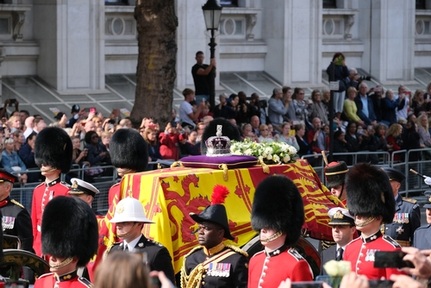Disabled and elderly fall sick in queue to see Queen unaware of shorter accessible route
Frail and disabled mourners who wish to pay their respects to the Queen by filing past her coffin, are falling sick in the long queue to see her at Westminster Hall because they are unaware a much shorter, more ‘accessible’ queue exists.

Charities have accused the government of failing to publicise a shorter 'accessible' queue for mourners who are elderly and disabled, after some suffered falls and dehydration in the general queue.
Fainting, falling and dehydration
St John's Ambulance has said it responded to 232 incidents in the queue to date (15 September). Paramedics of St John's Ambulance say they have treated people who have fainted, fallen, been dehydrated and others who have suffered blisters.
One disabled people’s organisation has said the government may have breached the Equality Act because of a failure to make reasonable adjustments for disabled people.
A shorter accessible queue for frail and disabled mourners can be joined by first going to a kiosk outside Tate Britain art gallery.
People with special accessibility needs must go to the kiosk outside Tate Britain on Millbank to receive a wristband with a time slot to enable them to join a much shorter queue. When it is the allotted time slot for their visit, individuals can join the shorter ‘accessible’ queue. Those joining this queue may be accompanied by one carer or companion.
The accessible queue opened at 5pm on 14 September. Time slots cannot be booked in advance and capacity for each time slot is capped. People are recommended to rest in the Tate Britain which has seating, toilets and ‘quiet space’ areas, while waiting for the next time slot to open.
The start of the accessible queue entrance in Victoria Tower Gardens, is approximately half a mile from the kiosk outside Tate Britain. The shorter step-free queue gives people access to a special lane along the side of the building, where, after security checks, they are let into Westminster Hall via a ramp.
‘Limited capacity for accessible queue each day’

A government document (published 14 September), stated that the 'separate accessible route' is 'for people unable to stand for long periods, or who have specific accessibility requirements (either visible or non-visible disabilities)’.
However, the government stated it ‘cannot guarantee everyone seeking a place in the accessible queue will be given access to the lying-in-state because of overall capacity limits.’
‘Please note that there will be limited capacity for the accessible queue each day, so entrance is not guaranteed. There will still be some waiting time for people in the accessible queue.’
Disability organisations such as Disability Rights UK (DR UK) have questioned how long disabled people may have to wait, even with an alternative more accessible queue.
Kamran Mallick, DR UK’s chief executive, said: “Given the decades that have gone into planning the events around the death of Her Majesty the Queen, it is disappointing that access to these events for disabled people is such a mixed bag.
“We welcome the potential of shorter waiting time slots and a shorter distance to queue for disabled people, but there is still a breathtaking lack of awareness around the needs of disabled people.
'Government fears people faking disability to jump queue’
“The government has said in a press release that 'people wishing to attend the lying-in-state, especially those with pre-existing medical conditions, are encouraged to check the guidance, plan accordingly and be prepared for significant wait times, including possibly overnight.' That is not a reasonable adjustment – as required by the Equality Act.
“The threat of confiscation of food, drink and portable shelter such as unfoldable umbrellas is in breach of the Equality Act. Many disabled people use these to double up as walking sticks. Disabled people often need food and water on the go, or to take with medication.”
Disability campaigners are also concerned about the distance between the Palace of Westminster and the bag drop location, and the apparent lack of Changing Places toilets.
Mr Mallick said the accessible bag drop and nearest first aid point is “at least 20 minutes away on the other side of the river from the accessibility kiosk at Tate Britain and the Palace of Westminster and there are no changing places in the accessible queue – only within the Palace itself."
This morning (Friday, 16 September) the general much-publicised queue reached 4.4 miles long. The Guinness World Record for the longest queue ever recorded is six miles.
The disability leader said: “We understand that the government fears people faking disability to jump the queue, but to focus on this rather than equity of access for disabled people is to create an inexcusable barrier to paying respects to the Queen for the fifth of the population which is disabled.
“How ironic that our monarch should sign the Equality Act into law over a decade ago, and end her life herself disabled, and yet still the government cannot enact the laws around equity of accessibility which she brought into being.”
The public can queue to see Queen Elizabeth II lying in state at Westminster Hall until 6.30am on Monday, 19 September - the day of the late monarch's state funeral.
Latest News
 29-Jul-24
Dementia Bus gives carehome.co.uk staff insight into life with dementia
29-Jul-24
Dementia Bus gives carehome.co.uk staff insight into life with dementia
 27-Jul-23
UK's top home care agencies in 2023 revealed
27-Jul-23
UK's top home care agencies in 2023 revealed
 30-Nov-22
A quarter of older people keep their falls secret from family
30-Nov-22
A quarter of older people keep their falls secret from family
 29-Nov-22
'Covid-19 has not gone away' say terminally ill
29-Nov-22
'Covid-19 has not gone away' say terminally ill
 28-Nov-22
IT consultant who received poor care opens 'compassionate' home care business
28-Nov-22
IT consultant who received poor care opens 'compassionate' home care business